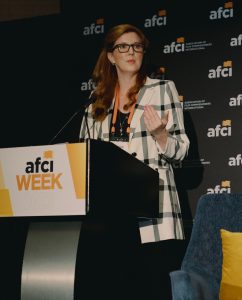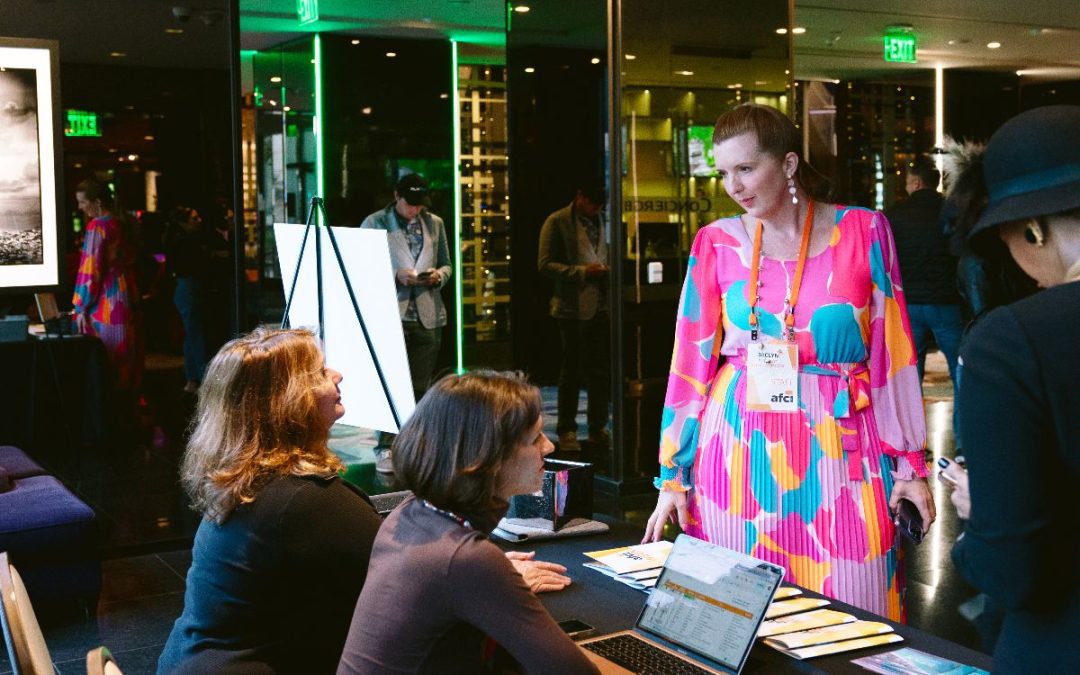An interview with Jaclyn Philpott | Executive Director, Association of Film Commissioners International
New Zealand native Jaclyn Philpott made a bold move, traveling halfway around the globe to lead the L.A.-based Association of Film Commissioners International (AFCI) early in 2023. Read about her strategy for infusing new opportunities for members and growing this nearly 50-year-old institution.
Destination Film: For those that aren’t familiar with AFCI, what can you tell us about the association?
Jaclyn Philpott: The AFCI began in 1975 right here in the United States of America. It originated as a community for film commissioners to learn from each other, share ideas and network.
Over the years membership has grown domestically but also globally and continues to have a strong emphasis on education, connection and knowledge sharing. AFCI has roughly 300 members worldwide. Roughly half the membership comprises US state and regional offices, a third of the membership is European based, and the remaining members represent every continent and region around the world. Our new strategic plan will see that membership number increase significantly as we bring on remaining Film Commissions worldwide and a range of new affiliate members. AFCI’s three membership categories include: film commissions. film liaisons and affiliates.
We offer research reports, best practices, curate large scale events for our members to connect with studio executives and industry professionals plus provide an accreditation course for members to become Certified Film Commissioners. Our goals are: to better serve partners and Film Commissions, to reach and engage more members, to empower effective partnerships and promote the role of Film Commissions.
In 2025 AFCI will be celebrating its 50th anniversary which is a huge milestone, we are excited to bring past and present together to celebrate and connect – planning starts now!
DF: What was your experience prior to AFCI?
JP: My background is economic development, strategy, transformation, marketing and program management. I completed an MBA with a specialization in growth strategies and in previous years undertook a number of consulting projects for small and medium businesses across a wide range of industries.
My screen experience relates to my time with Screen Auckland, New Zealand as the Senior Marketing Lead responsible for promoting our industry capacity and capabilities while attracting production to the region. The role involved working closely with the regional film offices of New Zealand (RFONZ) and the New Zealand Film Commission + local industry of course. I took the time in that role also to really understand what was going on for businesses in our region to see how we could collaborate to solve problems together. I’m skilled at analyzing my environment pretty quickly, seeing the gaps and understanding what needs to be done to execute on the strategic plan.
DF: What was your first impression of the AFCI organization?
JP: As I studied for the interview and then progressed through the process, I was starting to see that AFCI was in need of transformation. While we are 48 years old it’s almost like creating a start-up which is an exciting place to be. I could see very clearly there were a huge amount of opportunities right in front of us, taking into account the rapid changes occurring in the production industry as a whole, as well as ever evolving technology changes plus the need to bring the industry together and bring them closer to the Film Commissions. There was also a need to really power up the value we were providing to Film Commissions worldwide, there is an almighty amount of work to do but we have the plan now and I’m selling the vision and behind the scenes there is so much being created. I’m attracting great humans and starting to bring in more funding so the hard work is paying off. It doesn’t mean I slow down though – the pace will need to continue for the next two years to ensure we meet our goals and targets. I sense, one of the main reasons why I was successful in obtaining the role was due to this transformational perspective and the belief that we could do it together.
DF: You started this position and were thrust into the organization’s event, AFCI Week. How
was that experience?
JP: When I took this position, I got off the plane on the 11th of January, literally unpacked and opened my laptop because we had to create and then deliver the 2023 event in 10 weeks – myself and Marjorie Galas [Senior Director, Members & Education] worked incredibly hard and managed to bring on some extra help towards the end – it was a baptism by fire. I’m a seasoned event manager though and have experience with major events so it wasn’t the event so much it was

AFCI Week Presentation
getting my head around the business, the city, the country, the members, the team, the laws and every single other thing you deal with while walking into a new role and a new country – however an incredibly short timeframe to deliver an amazing went was a lot of pressure. We did it though and I am really proud of the whole team who ended up being part of every aspect of delivery.
It became an amazing opportunity for me to learn very quickly. I interviewed 170 of our members in the 10-week period prior to AFCI Week. My days were incredibly long but it was a necessity so I could understand what their experience of AFCI had been, what they wanted for the future and in the event but mostly to help me uncover some quick wins around opportunities that existed. Knowing I would go into a much deeper dive after the event developing a proper strategy, this approach was a great first cut of potential strategic ideas and enabled me to start creating relationships immediately.
I gave them full opportunity to do a complete download with me because, when I got to that event, I had to stand up on stage at the members meeting and say, “Hi, I’m Jaclyn and this is what I’m going to do because this is what I’ve learned and what you’ve told me and what I believe is possible.”
I needed to speak from a place of deep awareness, state the facts and understand the journey that members had been on. I was incredibly transparent – we tend to be rather black and white as New Zealanders – up front you might call it. Sometimes coming into these positions at a time of transition, the baptism by fire is the only way it’s going to work. You sink or swim but leading with integrity and empathy you can’t really go wrong because it is what it is. I’m choosing to swim.
What I found really overwhelming in a positive way was how friendly and warm AFCI members are and how much they love connecting with each other. I had never received so many hugs from people I didn’t know before and they have been and continue to be the most supportive group of people, I feel like I have bonded really well with so many of them – the industry doesn’t really understand how valuable these people are and how amazing they are at their jobs and how connected they are to their regions. Part of what I want to do is help raise awareness of the importance of their roles but them as people too.
DF: As you establish yourself in this new role, what are your primary objectives?
JP: There’s a lot of work to be done internally to bring the organization into the future right down to the tech stack we are working with so there is much going on behind the scenes however from a program delivery & product development perspective the core training needs of film commissions such as Economic Development and Workforce Development are areas where I feel AFCI can provide more support and resources over the coming months and years. The list is long, we have great aspirations for what we can deliver and I can’t wait for you to see – some of which I just can’t say right now!
Our new mission is enabling film commissions and industry partners to bring successful productions to life through knowledge sharing, skill development and connection. We’re the only professional organization in the world that offers training for film commissions and film commissioners.
The heart of our membership will always be the film commissions because that’s why we exist however I understand the need to wrap ourselves around the rest of the industry and bring them into the fold knowing we can offer value to all levels of members and create stronger connectivity within the industry.
DF: How will that influence the organization?
JP: When we look at our revenue from this year to what the projections are for next year and the year after, they significantly change for the better because of bringing on new members and creating new products that connect them with regions and film commissions, but also provide insight and value in a way that’s never been provided before.
With all of that comes quite a significant change to the internal workings of AFCI. So obviously, I need to expand the staff and resources provided. I need to change systems of operations. There needs to be a whole lot of new product development and not all of that can happen in one year.
DF: What type of educational programs do you have in place? What do you envision for the future?
JP: Currently we offer a series of courses in AFCI University; a name that is up for possible rebrand. For example, Film Commission Fundamentals gives people an overview of what it means to work in a film commission. We also offer the AFCI Certified Film Commissioner track, which is a certification that is very specific around being a film commissioner. And then we have master classes on economic development, marketing and a number of other modules.
We have been working quite hard over the last four months to determine what a complete education review looks like. And in fact, part of the new strategy is to put an emphasis on getting certification so that it helps standardize the film commission profession around the world.
AFCI also offers a number of Best Practice documents that provide a standardized manner of approaching issues for our film commission members. We’re currently working on expanding our collection of best practice documents – we have roughly 25 topics we’re planning to provide this document on over the next two years. Best Practices has to be a constant new product development opportunity. Marj Galas has been in the business nearly six years and knows this inside out, she is such a valuable resource and has fantastic relationships with the members so I love hearing her ideas in this space.
DF: How do you fund these educational initiatives?
JP: Our revenue comes from many places including selling the courses, we also partner with the private sector to fund development. It is important to note that non-members are welcomed to take the classes as well.
DF: You’re representing this global industry and within that you’ve got big members, you’ve got small members. What could be trending in Africa is different from what’s trending in Asia. How do you balance that?
JP: That’s one of the opportunities I saw in the research – I’ve recognized that we don’t have regional leaders around the globe and we should. I’ve identified 11 global sections and created 25 regional leader positions that film commissioners will be able to apply for and eventually other members will be able to take up. Those selected will work roughly 4-8 hours a month providing various insights back to AFCI HQ without giving too much away before the big launch which will help us create products and stay connected in those regions. That’s quite a big job in itself and it will take time and money to get that rolling. At the same time, we work very closely with the regional film commission networks, including: the European Film Commission Network, Asia Film Commission network, Latin America and Caribbean Film Commission network and Film USA. We’re also helping the regions of Africa establish a film commission network.
DF: Are you fielding inquiries from destinations that are looking to start film commissions?
JP: All the time. It’s not a simple process to create a film commission: AFCI has a Best Practice document devoted to assisting those individuals interested in developing a film commission. Additionally, before we accept a film commission as a member of AFCI, we have a process of vetting and ensuring the office is a legitimate film commission.
I’ve also been engaging with those offices who were members in the past but had to leave the organization – sometimes due to legislative changes, office restructuring or budgetary reasons.. I’m making sure that they know that I’m here, “Here’s the strategy. This is the vision. Come back on board when you’re ready.”
DF: Last question, how can we make sure that the awareness around the importance of a film Commission is increased?
JP: Through the new AFCI strategy and the increased levels of AFCI membership, I’m focused on building awareness of AFCI which will help build awareness of the film commission profession. AFCI is also working on some documents that commissions may use to present to government officers, potential funders or anyone to highlight the benefit of their office and work. Engaging more students and emerging content makers, and ensuring they are aware of the importance of a film commissioner is also a goal I have.
It’s an ever changing industry and we’re going to be doing our best over the next few years to really power up the education and products that they offer. There is a significant marketing and public relations play to be started too, all with good time – I have some pretty big side projects that will be critical to the future of AFCI including the creation of a new digital platform amongst other things. It’s all about timing, funding and phasing.
We’ll be quite a different-looking & functioning organization over the next couple of years and I can’t wait for the Film Commissions firstly to really see the improvements for them, especially around us bringing more of the industry directly to them but for the wider industry when it’s time to bring them on board – sharing what we can also do for them.
It’s a really exciting journey to be on.







